 Petzlover
Petzlover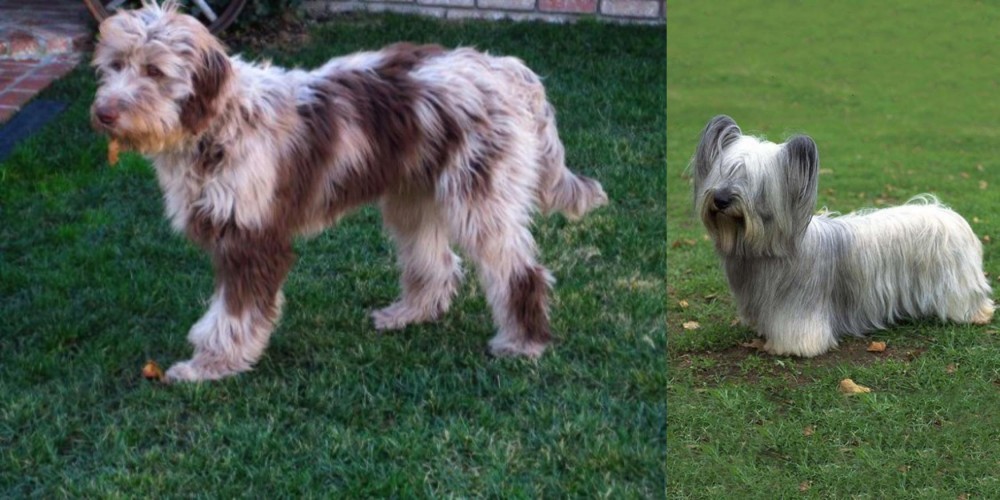 Aussie Doodles is originated from United States but Skye Terrier is originated from United Kingdom. Aussie Doodles may grow 24 cm / 10 inches higher than Skye Terrier. Aussie Doodles may weigh 13 kg / 29 pounds more than Skye Terrier. Aussie Doodles may live 3 years less than Skye Terrier. Both Aussie Doodles and Skye Terrier has almost same litter size. Both Aussie Doodles and Skye Terrier requires Moderate Maintenance.
Aussie Doodles is originated from United States but Skye Terrier is originated from United Kingdom. Aussie Doodles may grow 24 cm / 10 inches higher than Skye Terrier. Aussie Doodles may weigh 13 kg / 29 pounds more than Skye Terrier. Aussie Doodles may live 3 years less than Skye Terrier. Both Aussie Doodles and Skye Terrier has almost same litter size. Both Aussie Doodles and Skye Terrier requires Moderate Maintenance.
 It is interesting to note that the Australian Shepherd doesn’t have much in common with the land ‘down under’. The dog has always been a popular companion dog in the United States as a working dog. As a hybrid, the Aussiedoodle is a new breed that doesn’t have a detailed history, but it is worth taking not that the 2 breeds that have been used to create the Aussiedoodle do have long histories each.
It is interesting to note that the Australian Shepherd doesn’t have much in common with the land ‘down under’. The dog has always been a popular companion dog in the United States as a working dog. As a hybrid, the Aussiedoodle is a new breed that doesn’t have a detailed history, but it is worth taking not that the 2 breeds that have been used to create the Aussiedoodle do have long histories each.
It is believed that the name of the Australian Shepherd is because the ancestors of the dog arrived from Australia in the United States and were named from where their ancestors previously resided. The Aussiedoodle has only emerged on the scene in the last 10 years and is becoming hugely popular. The breed isn’t recognized by the American Kennel Club but are recognized by the American Canine Hybrid Club.
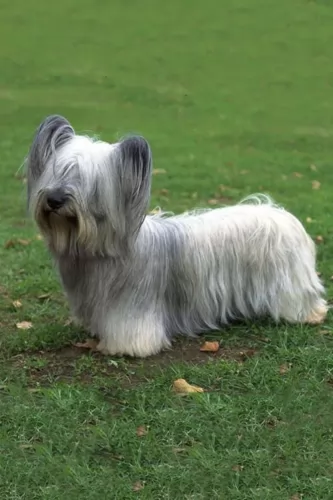 The Skye Terrier is a hardy dog breed and is actually considered to be an endangered native dog breed in the United Kingdom.
The Skye Terrier is a hardy dog breed and is actually considered to be an endangered native dog breed in the United Kingdom.
They were found on the Isle of Skye, although there is some confusion about its history. They were used long ago to hunt but these days they are essentially companion dogs.
They found their way to America and the Skye Terrier Club of America was founded in 1938. The American Kennel Club recognized the breed in 1887.
 The Australian Shepherd was bred to herd livestock together, and with the Aussiedoodle, you’ll still sometimes see this trait, and he may well try to herd his human family into the car. The Aussiedoodle can’t always be expected to look the same as they come in many sizes and shades of colour, some leaning more towards the Poodle and others more towards the Australian Shepherd. He is a medium- to large sized dog with a strong-boned, muscular structure.
The Australian Shepherd was bred to herd livestock together, and with the Aussiedoodle, you’ll still sometimes see this trait, and he may well try to herd his human family into the car. The Aussiedoodle can’t always be expected to look the same as they come in many sizes and shades of colour, some leaning more towards the Poodle and others more towards the Australian Shepherd. He is a medium- to large sized dog with a strong-boned, muscular structure.
The coat of the Aussiedoodle can differ somewhat, with most having wavy or curly hair while others have fairly straight hair. The dogs are available in many different colours, from solids to patterned and in shades such as black, grey, silver and blue merles. Size can vary too, depending on whether the Aussiedoodle had a miniature or standard poople involved with the pairing.
The Aussiedoodle is exceptionally clever and also very energetic. This dog breed will require training, socialization and exercise. Training an Aussiedoodle is easy as you will see he is eager to please.
The Aussiedoodle loves his family and this isn’t a dog that can be left outdoors all day on his own. He is lively and energetic, and left too long on his own, he can become bored and destructive. This hybrid makes the perfect pet for families with kids, with no aggressive tendencies. He can also be introduced to other pets in the home as he is a friendly, amicable breed who wants to please.
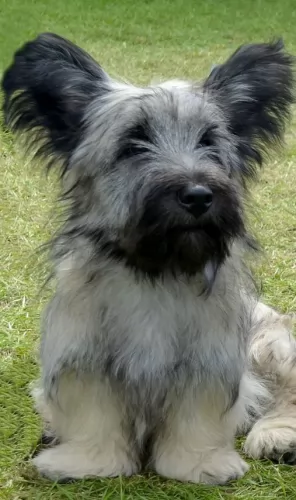 The Skye Terrier is a medium-sized dog standing at between 23 and 26cm in height and weighing between 12 and 18kg. The legs are short and sturdy. He is double coated with the top coat being straight and hard and forming a beard around the face area. The coat can be fawn, and in various shades of grey which are sometimes even black. The ears of the dog are medium sized and erect.
The Skye Terrier is a medium-sized dog standing at between 23 and 26cm in height and weighing between 12 and 18kg. The legs are short and sturdy. He is double coated with the top coat being straight and hard and forming a beard around the face area. The coat can be fawn, and in various shades of grey which are sometimes even black. The ears of the dog are medium sized and erect.
The Skye Terrier has always been a hunting dog and he enjoys quite a bit of exercise – walks, ball games as well as indoor games. Small though he may be, he is strong willed with a mind of his own and will benefit from being trained and socialized.
This is also necessary as he has a fairly reserved nature. He gets on well with children and makes an excellent family pet but he is ready to take on smaller pets in the home. He will bark when confronting strangers and makes an excellent watchdog too.
He is able to adapt well into life in the city or the countryside. He isn’t a dog to be left outside day after day and will just die of boredom, frustration and loneliness.
 The Aussiedoodle is an intelligent, outgoing, patient and devoted family pet who will happily slot into any home where there are children and other pets.
The Aussiedoodle is an intelligent, outgoing, patient and devoted family pet who will happily slot into any home where there are children and other pets.
Most Aussiedoodles love being active and you’ll want to include him in all your activities – walking, swimming, ball games and herding.
Yes, it is true that the temperament of your Aussiedoodle will depend on the canine parents but he will also be influenced by your lifestyle and environment too.
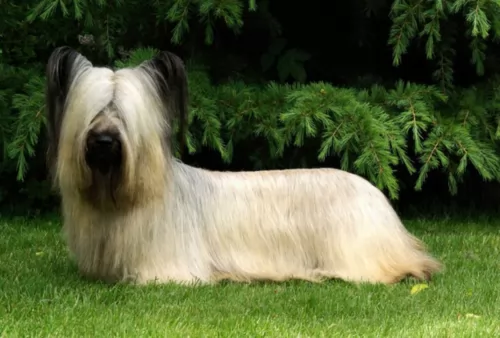 Give the Skye Terrier the attention he wants and he will reward you with his loving companionship.
Give the Skye Terrier the attention he wants and he will reward you with his loving companionship.
He loves the entire family but is best suited to homes where children have been taught to be kind to animals and to treat them with respect.
He has moderate energy levels and will expect you to give him a fair amount of exercise. The Skye Terrier can make an excellent companion for you and your family.
 As with most mixed-breeds, Aussiedoodles are a healthy breed, and your pet won’t come with any hereditary ailments. Both Australian Shepherds and Poodles have few inherent diseases, and by mixing the two, you get a robust breed.
As with most mixed-breeds, Aussiedoodles are a healthy breed, and your pet won’t come with any hereditary ailments. Both Australian Shepherds and Poodles have few inherent diseases, and by mixing the two, you get a robust breed.
Having said that, you always have to be aware that any dog, including your Aussiedoodle can inherit certain health problems of both the Poodle and the Australian Shepherd.
The Australian Shepherd is susceptible to vision problems and some health problems with the Poodle include epilepsy, renal disease and cancer, but in spit of this, the good news is that there aren’t many documented health issues with Aussiedoodles.
Always research and find a reputable breeder of Aussiedoodles who has certificates that the parents are sound and free from common health defects. Make sure that you get your puppy vaccinated from 8 weeks of age to avoid the common, deadly canine diseases that can rob you of your puppy. The very first vaccination will be for distemper, measles and parainfluenza.
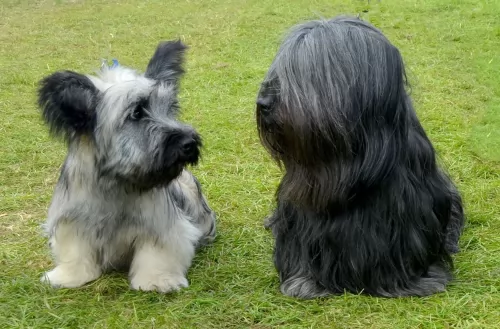 The Skye Terrier is a healthy dog breed. Perhaps the only issue that could be a problem with him is orthopedic problems. He is an achondroplastic dog, meaning a large body on small legs.
The Skye Terrier is a healthy dog breed. Perhaps the only issue that could be a problem with him is orthopedic problems. He is an achondroplastic dog, meaning a large body on small legs.
He could develop spinal problems if he were allowed to constantly be jumping off beds and high chairs.
Orthopedic problems affect the bones, muscles and joints and can actually be debilitating. Orthopedic conditions can be ligament tears or hip dysplasia for instance, accompanied by arthritis.
You’ll notice your dog has an abnormal way of walking or running, inability to get up once lying down and he may have arthritis and pain.Be careful because obesity can trigger problems with the joints and bones.
 The coat of Aussiedoodles need minimal maintenance. This is because of the Poodle input which is a low shedding dog. Aussiedoodles shed very little, but you will still need to give your dog a regular brush every other day to remove loose hairs and to also prevent matting. You can even include some professional grooming as his thick coat can quickly look dirty and unruly.
The coat of Aussiedoodles need minimal maintenance. This is because of the Poodle input which is a low shedding dog. Aussiedoodles shed very little, but you will still need to give your dog a regular brush every other day to remove loose hairs and to also prevent matting. You can even include some professional grooming as his thick coat can quickly look dirty and unruly.
Brush the teeth of your Aussiedoodle with special dog brushes and toothpaste to prevent plaque forming. You can also book an appointment at your local vet to have his teeth cleaned if you are reluctant to do it. it.
An Ausiedoodle under 6 months of age should be fed 3 or 4 times daily. Once your Aussiedoodle is 1 year of age you can cut the meals down to 1 or 2 meals a day.
Always select high quality foods and understand the labels and ingredients. Cheaper foods with ‘bad’ ingredients can mean more medical bills because of malnutrition.
Speak to your vet about feeding your Aussiedoodle. You can also prepare cooked meals for your dog and include chicken, meat, rice and vegetables. Remember this is a high energy dog and he will require foods high in protein to meat his daily energy and nutritional requirements.
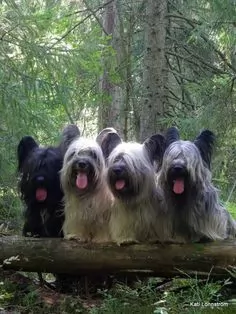 ● The coat of the Skye Terrier is long and silky and will most certainly require brushing every day if you keep the hair long. Such silky hair can easily become matted.
● The coat of the Skye Terrier is long and silky and will most certainly require brushing every day if you keep the hair long. Such silky hair can easily become matted.
● Little dogs like this will need their teeth being checked regularly. You can even try to buy special pet toothpaste and toothbrush and brush his teeth yourself. If you prefer, a professional dog groomer can do this for you and at the same time trim his nails and check his ears and clean the insides of the ears too to avoid infection.
● Provide him with top quality food as the quality of the dog food you buy makes a huge difference to his health and longevity. He is a small dog and there are some excellent commercially manufactured dog foods specially made for small, energetic dogs.
Try to include some home-made food for him which can be simply mixed into the dry kibble twice a week. Boiled chicken, brown rice or pasta and spinach, sweet potatoes and carrots is super tasty and nutritious. Ensure there is always a bowl of fresh, cool water within his reach.
● Keep his vaccines up to date against some deadly canine diseases, and get him to the vet when he shows signs of illness.